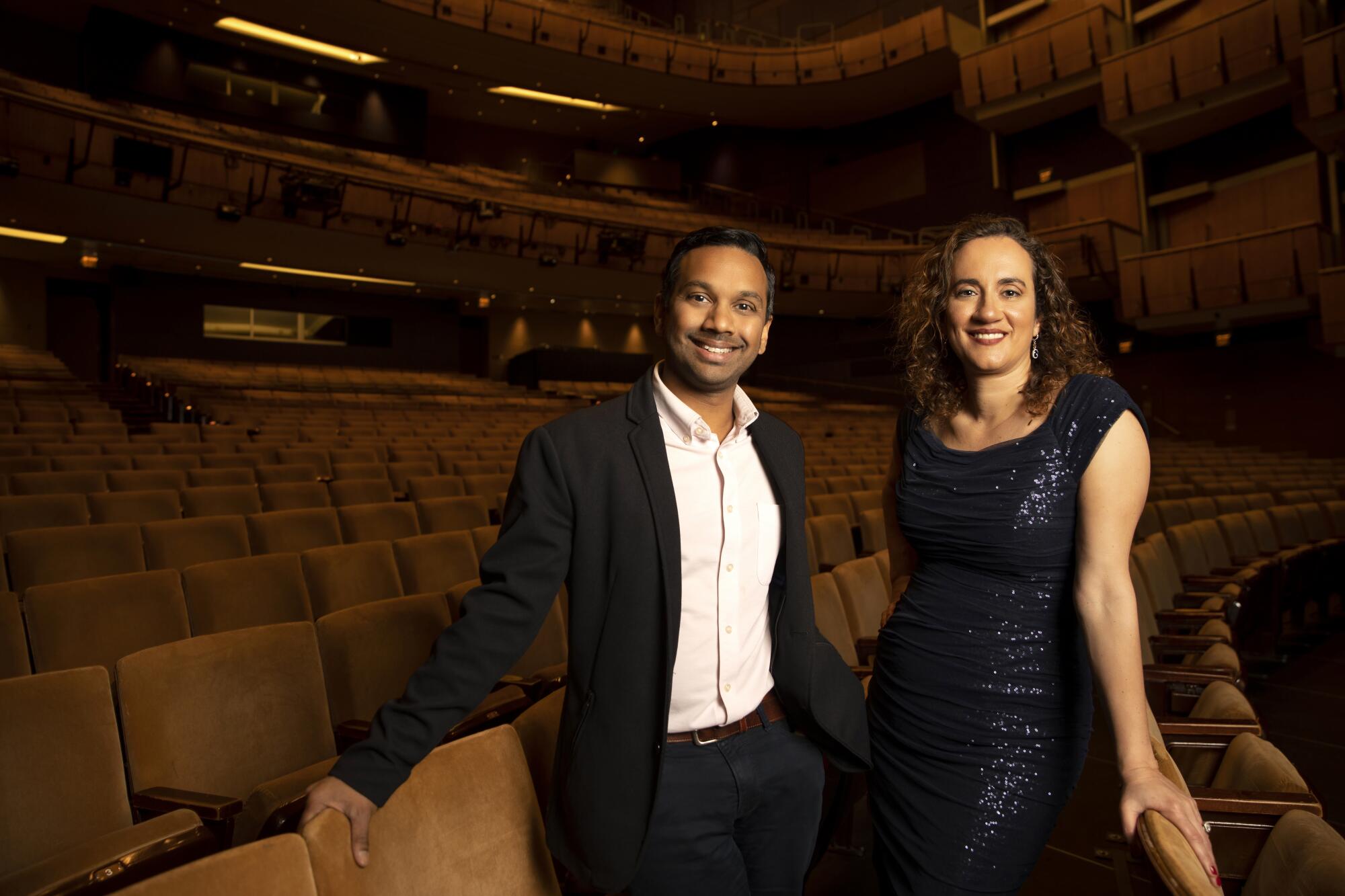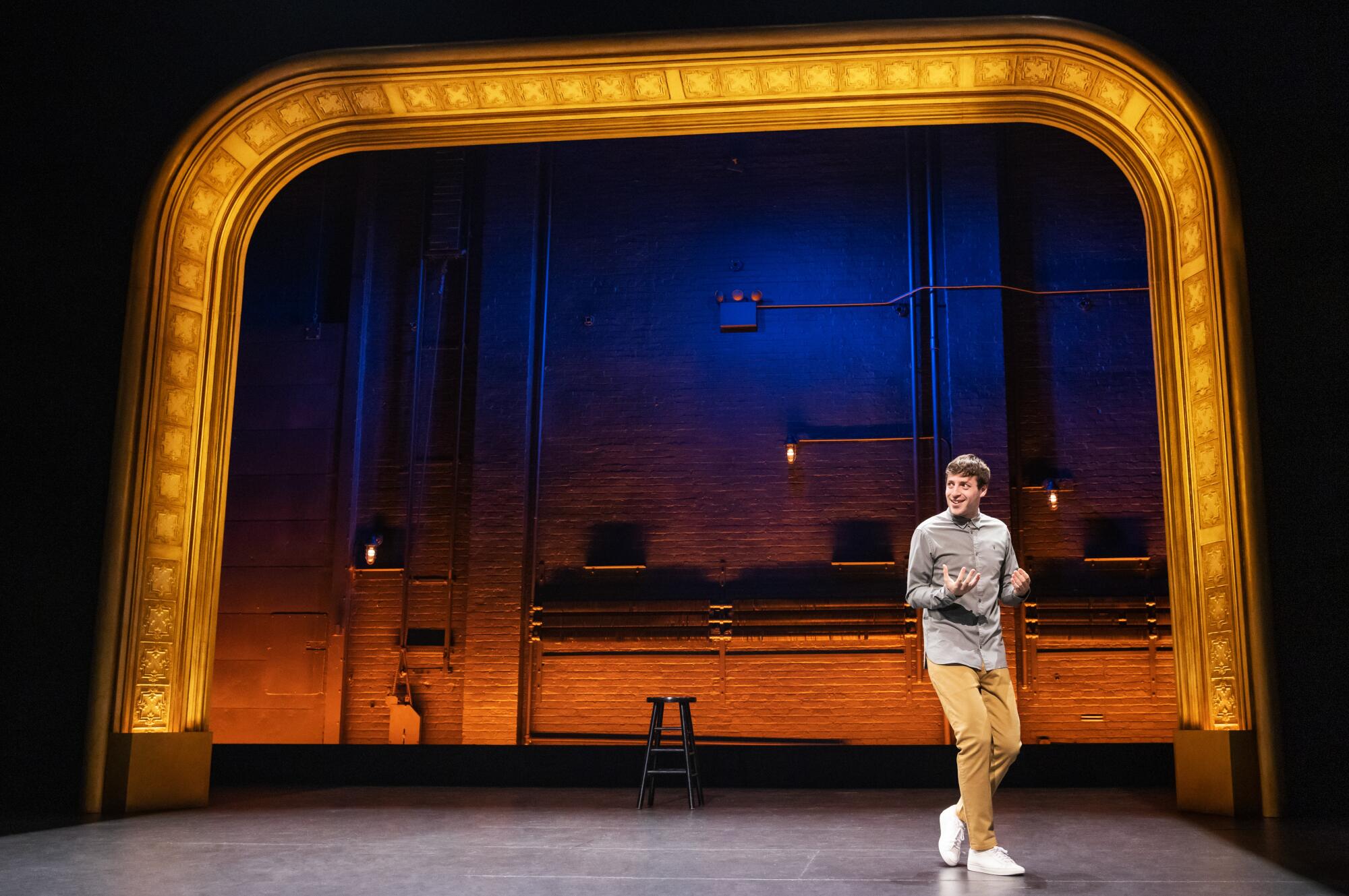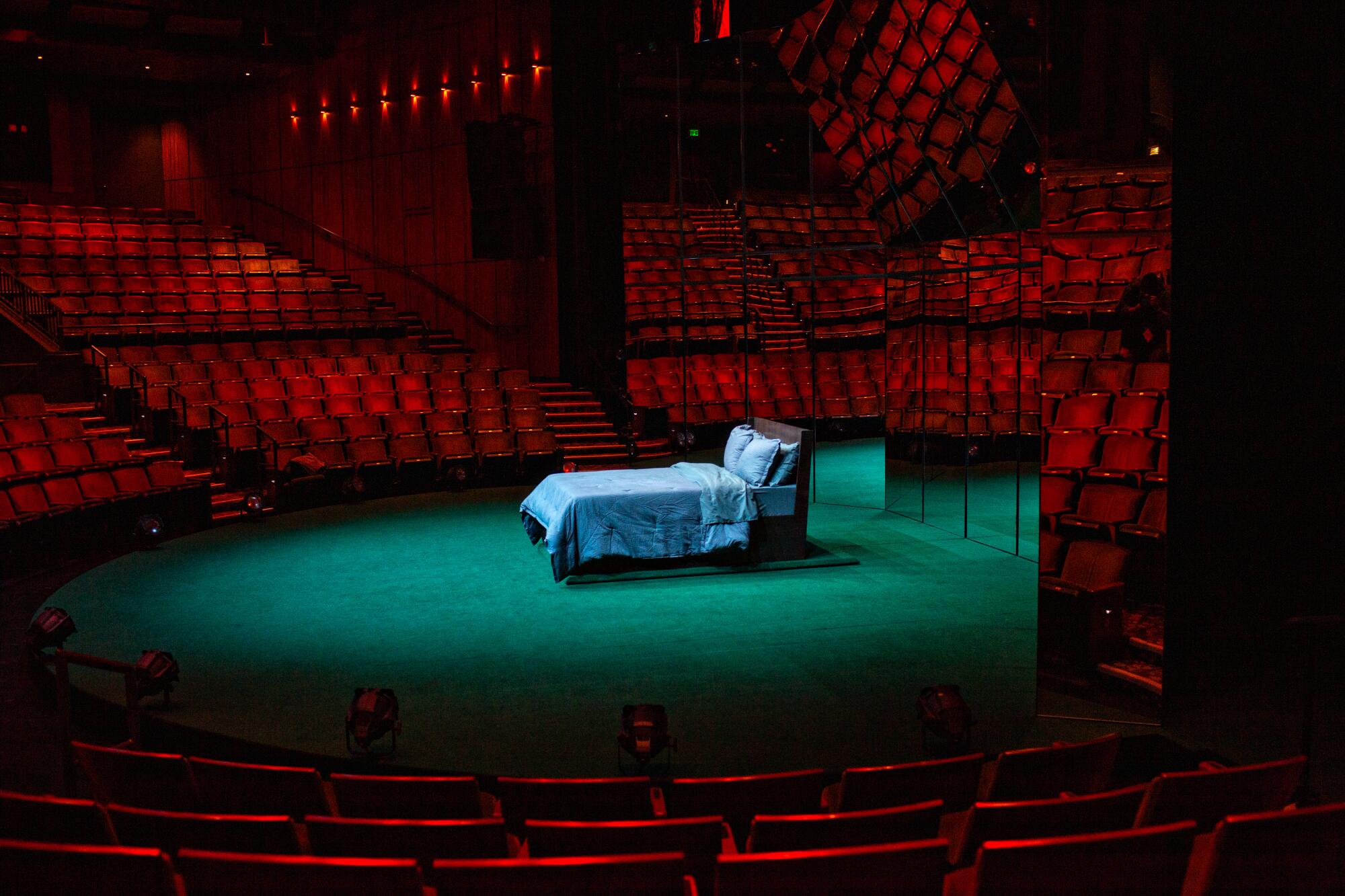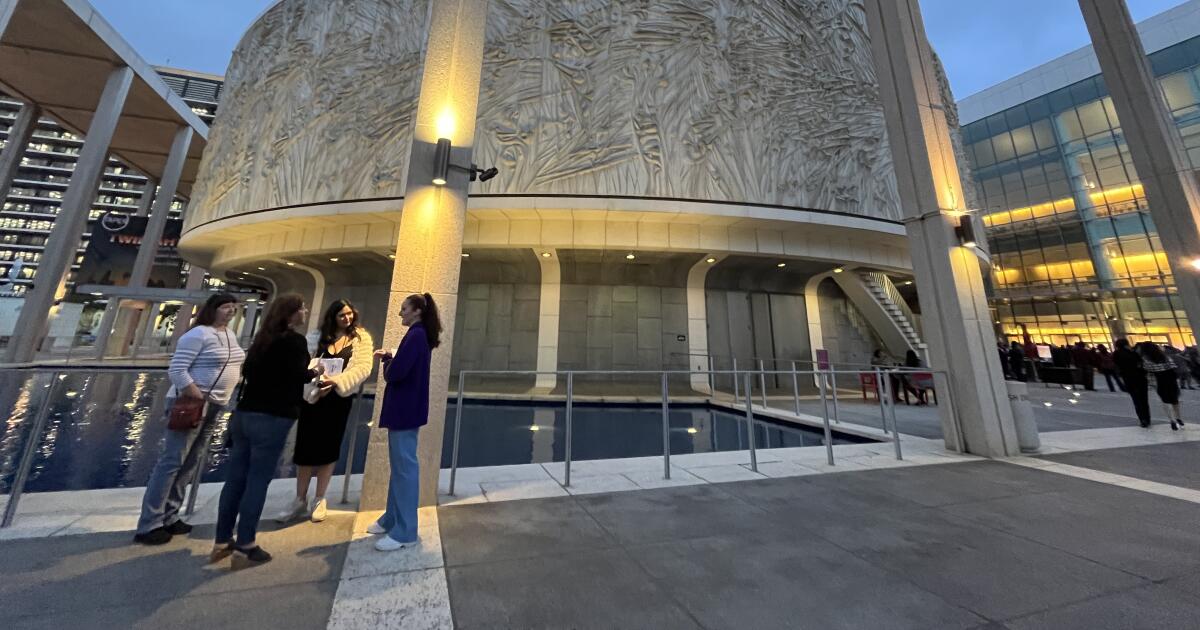From the outside, Center Theatre Group headquarters, a nondescript building across the street from the Music Center, is spectacularly unimpressive, the kind of place your mind wouldn’t even register as existing. But inside, the buzz of puzzle-solving energy might make you think you’ve stumbled onto the set of “Oppenheimer.”
CTG Managing Director and Chief Executive Meghan Pressman and Artistic Director Snehal Desai aren’t cracking nuclear codes. But they are working out a theatrical Rubik’s Cube that is harder than ever to solve.
An announcement is coming in the next few weeks about the new CTG season, and the big news is that the Mark Taper Forum, which suspended programming last summer amid a spiraling budget crisis, will be back in business (likely by next winter and possibly as early as the fall). The exact timeline and number of productions are still being worked out, but the idea is to consolidate offerings under one CTG banner rather than spotlight separate seasons at each of CTG’s three theaters.
This strategy is a sign of constriction, but it’s also an indication that old habits and expectations have to give way to stringent new realities.
Gordon Davidson, the founding artistic director of Center Theatre Group, built Los Angeles’ flagship theater organization in a vastly different era. The three venues — the Mark Taper Forum and the Ahmanson Theatre at the Music Center in downtown Los Angeles and the Kirk Douglas Theatre in Culver City — each with its distinctive profile and following, don’t easily cohere in the best of times, and this period is one of the most difficult in the company’s history.
The Ahmanson in recent decades has dedicated itself to Broadway touring productions, with an emphasis on musicals. The Taper, the place where Tony Kushner’s “Angels in America” had its two-part world premiere, has long been the city’s most coveted stage for public-minded drama. And the Douglas, the smallest of the three venues and the one with the shortest history, is the Westside outpost that’s most hospitable to theatrical risk-taking.
As the money-making operation, the Ahmanson helped make possible the artistic ambitions of its less practical brethren. But those days were waning even before COVID-19 wreaked unfathomable havoc on performing arts institutions.
The post-pandemic picture is improving but from such a low that no one can feel confident about moving forward. Theater attendance hasn’t yet rebounded to pre-pandemic levels, production and administrative costs have skyrocketed with inflation, and donor fatigue has turned to exhaustion.
Nonprofit theaters nationwide are contending with this perfect storm. But CTG has an additional set of challenges that stem from its disparate three-part structure.
The Ahmanson can no longer be counted on as the cash cow, as the subscription model has become less reliable and competition for Broadway tours has grown more intense. Shows that might once have been expected to play at the Music Center are booked into the Hollywood Pantages or the Dolby instead. When CTG signs on as producer to improve its competitive standing, as it did for the wilted revival of “The Secret Garden,” it exposes the entire company to seismic financial shock when the show turns out to be a flop.
Playgoing has suffered acutely since theaters have reopened. Serious drama without a celebrity draw is an extremely tough sell in this era of entertainment-on-demand and social media hypnosis. For a large playhouse like the Taper with punishing built-in costs and an audience that has grown understandably fickle after seasons of muddled vision and earnest mediocrity, the producing picture can seem like a fast track to insolvency.
Finally, the Douglas is facing a temporary closure of its own. An impending construction project of a neighboring property will force the theater to halt operations for a few months next year, making programming extremely difficult to plan, as anyone who has dealt with the shifting calendar of a renovation project knows all too well.

Artistic Director Snehal Desai, left, and Managing Director Meghan Pressman photographed last year after the announcement of Desai’s appointment.
(Kim Newmoney)
No wonder Pressman and Desai have the air of emergency aid workers who have settled into the long daily haul of rebuilding after the initial phase of catastrophe. When I met with them last June, after CTG announced that it was pausing programming at the Taper, the interview was tense and at times chaotic and contradictory.
Newly appointed Desai, treated to a baptism by fire, hadn’t even signed his contract at that point. Pressman, furiously working to keep the lights on, deflected questions about artistic decision-making and financial management that harked back to leadership issues predating the pandemic fallout.
Nine months later, they presented a calmer front. The mood of the interview was sober. Progress has been made on the $8-million projected budget gap that prompted CTG to postpone the premiere of Larissa FastHorse’s play “Fake It Until You Make It” and suspend plans for the 2023-24 season at the Taper. But this is no time for phony exuberance.
It seemed almost impertinent to ask whether they believed a sustainable path for CTG was feasible in this uncertain environment, but the question needed to be asked. Pressman answered in the affirmative, but before she did there was a pause as lengthy as any in a Harold Pinter play.
“I think it’s feasible, otherwise I wouldn’t want to ask for people’s money right now,” Pressman eventually replied with quiet conviction. “I believe in the art we’re doing. I think [a sustainable path] is feasible, but I just don’t know exactly what that’s going to look like.”
A battle plan, however, is being refined. The Taper hasn’t been dormant in this period of hiatus. Experiments in the form of special events, community gatherings and legacy celebrations have been tried. The most high-profile of these offerings, comedian Alex Edelman’s solo show “Just for Us,” was such a big hit that it has already had two return engagements.

Alex Edelman brought his hit “Just for Us” to the Mark Taper Forum.
(Matthew Murphy)
“We’re introducing shorter and more nimble programming models,” Pressman said. “We’ve been exploring different ways of engaging the community. I think those are all elements of a future sustainable Center Theatre Group, but we just don’t know how it will all settle.”
“I think the value of what we do is clear,” Desai said. “I just think it’s going to look very different.”
“And yet it’s got to feel the same,” Pressman interjected. “We have these venues that have this promise of high production value, of great American theater, the next best new play — all of that is still part of the DNA.”
Outstanding work, Desai agreed, has to be the raison d’etre of their collective efforts. He’s drawn to theater that is “timely, relevant and urgent,” even when offering a much-needed escape. Laughter and pleasure, he acknowledged, must be part of the equation. Theatergoers shall not live by moral instruction alone. But the nub of the issue for him is “how” they produce this art, the range of artists they’re inviting in, the openness to new forms and collaborative modalities.
“When we announce the season, you’ll see what the priorities are,” he said. His list, which he reeled off the top of his head, includes centering L.A. artists, adjusting the balance of how much CTG is producing versus presenting, expanding co-productions and making the Taper not just a writer’s theater but a director’s theater as well. His first season, he said, will give audiences a good indication of the direction he wants to head in.
Building the audience for the Desai era is not going to happen overnight. “It will take three to five years to establish,” he said. “That’s what I learned at East West Players. That’s how long [Pasadena Playhouse producing artistic director] Danny Feldman told me it took him.”
Pressman added, “That’s what it takes to teach them your taste. You have to give them like one element at a time. If you want to change up two or three elements in the way that you produce or the vocabulary you teach the audience, you can’t do it all at once. They’ll freak out.”
A winter production at the Taper is more or less set, but whether there will be a fall offering is still a question. When I inquired what it would take to open the Taper before next year, Desai asked if I could write a check for $3 million. He was joking, but fundraising is a crucial piece of this fraught puzzle.
CTG’s multimillion-dollar budget gap is smaller but not zero. “This is a multiyear effort,” Pressman said. “And this is still the recovery story.”
How much would CTG need to be whole? “We are in active fundraising mode for our next season and are just a couple of million dollars shy of our goal,” Pressman said. “What we’re building toward is long-term sustainability, which will mean a change in how we operate and an increase in support.”

The bed on the set of “Slave Play” in an empty Mark Taper Forum, photographed in February 2022.
(Jason Armond / Los Angeles Times)
“This is a marathon, and I would say we’re coming upon a big relay point,” Desai said. “As we announce next season, we want folks to be there and support us, especially those who said they were so bummed out about the Taper. I hope they’re the ones that right away reach out to us and subscribe. We hope there’s something for everybody at CTG — that is our goal each season.”
“Our partnership has been really fulfilling,” Pressman said of her working relationship with Desai. “And you know this is hard work. We feel a lot of trust and belief and understanding in each other’s vision and strategy. And that is part of the strong base we’ve been building to be able to do these difficult things with a great senior team and with great support from the community. We’re right around the corner from a really big announcement, and a lot of deep thought and planning went into it.”
And is the board of directors doing everything it can? “Our board is perfect!” Pressman replied, theatrically enunciating the words into my digital recorder.
Desai echoed this diplomatic sentiment in his own remarks: “We’ve been internally having conversations about what we need and board members have been the first folks to step up. They have been great stewards.”
What about boards in general? I asked, looking for candor on a subject that has been something of an obstacle for nonprofit theaters struggling to evolve institutionally and culturally. But the last thing any leader wants to do is alienate those who hold the power of rescue in this make-or-break moment.
A strong advocate of CTG’s “significant civic role,” Desai wants the Taper to once again be a forum for public dialogue. But he knows he can’t do it alone.
“We were just in London,” he said. “And they were telling us that theater in London is back. The numbers are higher than they were pre-pandemic. But they don’t have to compete with the 405, right? It’s also cold and rainy there. We just have a different ecosystem. I do hope we live in a city where the theater can be central.”
If I could write that check for $3 million that Desai was ostensibly kidding about, I would. Not because success is guaranteed. But because CTG leadership is rigorously grappling with its fate, testing new possibilities and committing itself to moving forward with as much integrity as fiscally possible.
And because I don’t want to live in a city that turns its back on those cultural pillars that took generations to build.

